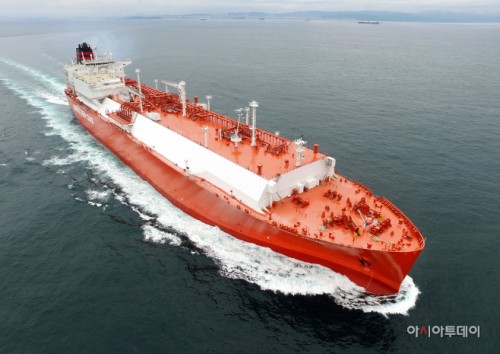 |
| A LNG carrier built by Hyundai Heavy Industries and delivered to Norway’s Knutsen./ Source: Hyundai Heavy Industries |
By AsiaToday reporters Choi Won-young & Choi Hyun-min
South Korean shipbuilders are expected to retake the lead for the first time in seven years, despite growing challenges from China. Many industry observers say that South Korea’s major shipyards have demonstrated their global competitiveness in liquefied natural gas (LNG) carriers that require advanced technology.
According to industry tracker Clarkson Research, South Korea received orders in November totaling 10,900,000 compensated gross tonnage or CGT, a measure of work needed to build a vessel. That accounts for 42 percent of the month’s global shipbuilding orders.
Chinese shipbuilders came second with 8,740,000 CGT, or 404 ships, accounting for 34 percent of the total, with Japanese firms in third place with 3,220,000 CGTs to build 160 ships, according to the data. Although China outpaces South Korea in terms of the number of shipbuilding orders in November, but it is certain that South Korea will win back the first place in terms of the number of cumulative shipbuilding orders this year.
The total number of ship orders this year hit 26 million CGT, up sharply from 12 million CGT in the same period in 2016.
Many industry observers say China is not only losing its price competitiveness with rising labor costs, but also losing its attractiveness in the market due to its low quality. “Compared to China, where there are few skilled workers and frequent design errors, we have advanced manpower that can meet the needs of ship owners,” an official from the shipbuilding industry said.
However, global trade volume, which is gradually improving, may become unstable due to the trade dispute between the United States and China. Besides, industry observers say it is too early to be optimistic because it can be a sharp rally due to growing demand for LNG carriers.
In fact, China ranked first with new orders worth 1,530,000 CGTs in November, followed by South Korea with 300,000 CGTs and Japan with 190,000 CGTs.
#South Korea #China #shipbuilding #Knutsen #Hyundai Heavy Industries
Copyright by Asiatoday
Most Read
-
1
-
2
-
3
-
4
-
5
-
6
-
7





















